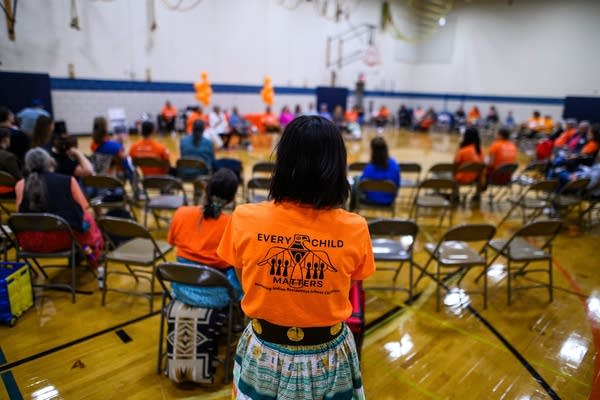Survivors of Native American boarding schools honored during ceremony

Go Deeper.
Create an account or log in to save stories.
Like this?
Thanks for liking this story! We have added it to a list of your favorite stories.
The Native American Boarding School Healing Coalition honored survivors of Native American boarding survivors Friday evening, and generations of children who did not return home to their families.
The grade school gymnasium at Anishinabe Academy, a public school in Minneapolis, was ablaze with orange T-shirts, many of which read “Every Child Matters.”
Orange Shirt Day, as it’s sometimes called, started in Canada with the story of an elder who recounted how an orange shirt given to her by her grandmother was taken from her as a 6-year-old child on her first day at a Catholic residential school.
Lt. Gov. Peggy Flanagan, a citizen of White Earth Nation, was the keynote speaker. She held in her arms a proclamation from Gov. Tim Walz instating Sept. 30, 2023, as a Day of Remembrance for children who died attending United States boarding schools in Minnesota.
Turn Up Your Support
MPR News helps you turn down the noise and build shared understanding. Turn up your support for this public resource and keep trusted journalism accessible to all.
Flanagan read aloud from the proclamation to the gathering:
“The deaths of children while under the care of the federal government or federally supported institutions, in addition to the loss of language and traditional practices, is a tragedy and a trauma long felt by the American Indian tribes, Alaska Native villages and Native Hawaiian community, but has far too long been unknown or acknowledged by dominant society.”
In a brief interview before the event, Flanagan was asked about the effects of boarding school within her own family. She told MPR News her grandmother attended one of the boarding schools.
“As a granddaughter, I hope the children who are here can be their full Indigenous selves without shame or judgement and just full of love,” Flanagan said.

Approximately a dozen survivors recounted some of their experiences during the event. George McCauley spoke about the importance of truth telling and healing.
“Today we need to get out of our comfort zone so the future generations will know our stories,” said McCauley.
McCauley attended Flandreau Indian School in the late 1960s. He recalled one day when he was 16 years old. He recalled a long walk back to the dorm room where two school staff informed him that his mother had passed away. He says the staff showed little compassion that day, providing him with just a bus ticket home.
“My whole life changed at that moment,” McCauley said. “I thought ‘Who is going to take care of me?’ and ‘Where do I go?’ It took me took me fifty years to realize I had some serious abandonment issues and that came from that moment.”
McCauley credits his wife Sandy White Hawk, who facilitated the evening’s event, with helping him to recover.
“For us, healing is not a destination, it’s a long-life journey.”
McCauley also spoke as an advocate for a bill which was recently introduced to Congress. In part, the bill would provide survivors access to the records of churches and government institutions who operated schools to locate any additional unmarked graves where children might still be buried.
Another survivor, Nancy Buckanaga Smith recounted the profound effect assimilation policy has had on her family. She said she’s the third generation of women in her mother’s family to attend boarding school.

She also shared it was a week ago that the remains of a relative who died while attending Carlisle Boarding School in Pennsylvania were returned to her community at Sisseton, S.D.
“It’s sad because he missed out on life. But we’re rejoicing because he’s back home with us,” said Buckanaga Smith. “Our relatives are coming home slowly from boarding schools, and I think our communities can start to heal from that.”
During the three-hour event, White Hawk and NABSHC staff also spoke about a new partnership which aims to preserve the stories of boarding school survivors. NABSHC will collaborate with U.S. Department of the Interior and the National Endowment for the Humanities to collect and share stories from Native American boarding school survivors and their families.
White Hawk, a survivor of forced adoption and a longtime advocate for survivors of Indigenous removal, says she is grateful both to the survivors who shared their stories and community who came to listen.
“So many people still don’t know about boarding schools, and when they hear about it, they are appalled, so this history still needs to be told,” said White Hawk.
Correction (Oct. 2, 2023): An earlier version of this story misspelled Anishinabe Academy.


